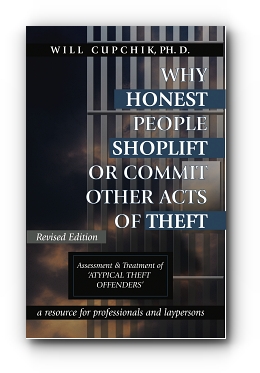| ||||||||||||||||||||
| Category: Self Help:Addiction | |
| About the Book | |
|
This
book describes the findings of Dr. Will Cupchik's more than a quarter-century
of clinical investigations into the atypical theft behavior of usually
honest persons, termed Atypical Theft Offenders (or ATOs)by Dr. Cupchik
in one of his earlier (1985)writings. Among the important findings of Dr. Cupchik investigations is that a great many, indeed most Atypical Theft Offenders are at risk to being wrongly diagnosed as suffering from kleptomania. Such a misdiagnosis almost invariably leads to a misunderstanding of the theft offenders' motivations, not only by themselves and their loved ones, but by clinicans, lawyers, loss prevention and human resourses personnel, and, subsequently by the judicial system. A major consequence of misdiagnosis is inappropriate treatment, both clinically and my the courts. The book and it's five major sections provides both professionals and laypersons with the following: (1) a detailed understanding of the dynamics underlying the ultimately self-destructive actions of these individuals; (2) appropriate tools that assist in clinically assessing them; (3) an overvieew of specialized psychotherapeutic approaches to treating ATOs; (4) highly useful information for relatives and/or friends who which to be of assistance in helping the theft offenders to stop their inappropriate, and illegal, behavior; and (5), suggestions aimed directly at the professionals who must deal with ATOs from the time they are apprehended to the time that they are dealt with by the judicial system and personnel. The book also mentions the Three-Day, Intensive Intervention Program for Atypical Theft Offenders developed by Dr. Cupchik to assist in the assessment and treatment of these individuals within a concentrated period of time. Two original pen-and-paper tools that can help the theft offenders and the professionals involved in their cases, are included in the book. The Cupchik Theft Offender Questionnaire (CTOQ) offers an organized means of gathering important information that, experience has shown, is frequently useful for the clinician to have, in order to begin to conduct a suitable assessment. The Cupchik Theft Offender Spectrum (CTOS), provides a first-approximation estimate of the degree to which a theft offender may be appropriately categorized as being either an Atypical, Typical or Mixed-Type (Atypical & Typical) of Theft Offender. The book contains 33 richly illustrative composite examples of these different categories of theft offenders. A highly informative and remarkable transcript of a single clinical session carried out by Dr. Cupchik with Alice (Case # 5) is provided. It is especially interesting that Alice was a religious and normally honest and highly ethical person who had never been apprehended, but was very distressed by her occasional theft behavior. Like most Atypical Theft Offenders, she was at a loss to understand her conduct. However, within the first session, the dynamics underlying her conduct became clear to both the client and Dr. Cupchik. The original finding by Dr. Cupchik that atypical theft behavior is often a loss-substitution activity is described in its various facets, as are the other categories of underlying motivations that precipitate theft activities in usually honest people. Ten tables summarize a good deal of the information gathered by Dr. Cupchik in his two major studies carried out in 1983 and 1997, respectively.
|
|
| About the Author | |
 |
Dr. Will Cupchik, member of the American Psychological Association and the American College of Forensic Examiners, is a registered psychologist in Toronto, with 27 years clinical experience with usually honest people who steal. He was formerly the Psychologist-in-Charge, Forensic Outpatient Psycholgical Services, at the Clarke Institute of Psychiatry. |

